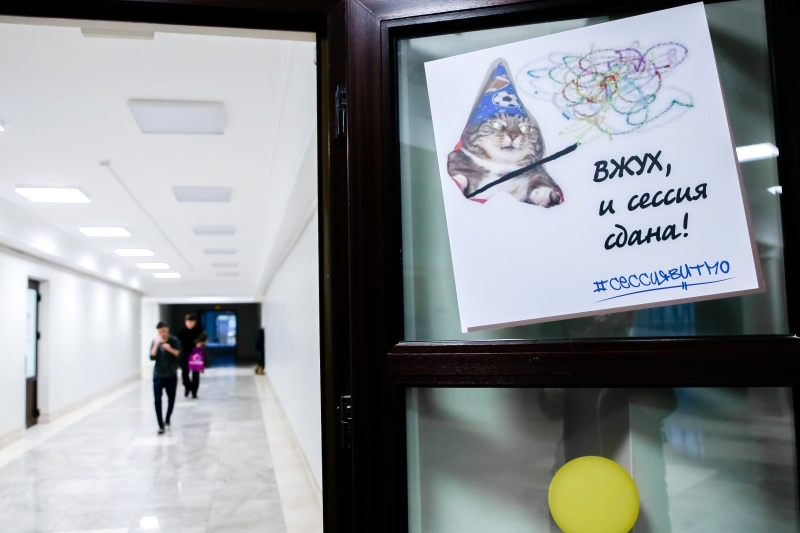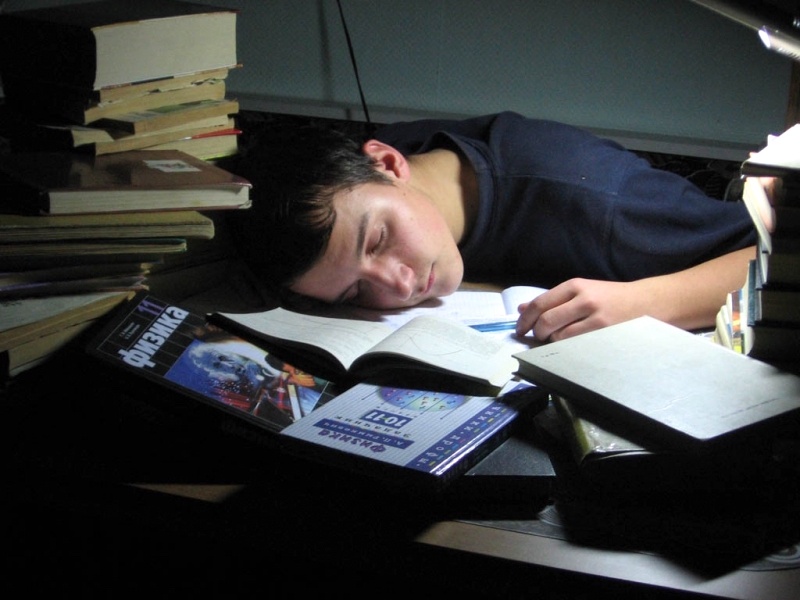How to "learn to learn" - tips, advice and research
Part 1. "Obvious" tips
Most of the recommendations for those who want to learn better looks pretty trite: in addition to attending lectures and doing homework, it is important to eat right, maintain a healthy lifestyle, get enough sleep, and follow the daily routine.
All this is certainly good, but what exactly can these student truths help the student? How to organize the daily routine so that you have more time to do and better memorize the material? Is there a real connection between thirst and cognitive abilities? Is it true that sport helps in school (and it's not just about extra points to the exam for the TRP badge )?
Let's try to deal with everything below.
')

Timing: how to properly manage time
During the day
In his new book When: The Scientific Secrets of Perfect Timing, writer Daniel Pink presents many tips on managing time in terms of biology, psychology, and even economics. Among them are some very specific recommendations that can help in learning. In particular, Pink advises to take circadian rhythms into account when planning workloads.
Circadian rhythms affect not only our sleep, but also our mood and concentration, which cyclically vary throughout the day. On average, seven hours after waking up, the concentration and mood reach the lowest mark, after which they start to increase again (therefore, many life coaches advise not to postpone important tasks and start them in the first hours after waking up). It is with our circadian rhythms, in particular, that the fact that the probability of errors at work (for example, in medical institutions) rises from 14 to 16 hours is linked .
Of course, students do not have to get up early every day, and at the same time, but an understanding of their chronotype and circadian rhythms can be used for the benefit of their studies. For example, the most difficult tasks (such as preparing for exams or a seminar) to plan for the first two or three hours after waking up - realizing that in the following hours the concentration will inevitably decrease (how to take this "unproductive" time, we will tell a little lower) .
Before deadline
Of course, the shortage of time is most acutely felt on the eve of the exams. By the way, “pull to the last” is not just a habit of careless students, in fact, this behavior is typical for most of us. One of the examples that Pink cites in his book is a study by scientists from the University of California at Los Angeles who showed that most of the groups of subjects during experiments do nothing (or practically nothing) at least the first half of the time before the deadline, and only then get down to work.
To avoid the “burning train” effect, scientists advise you to set intermediate goals and use the “chain driving” technique: every day, during which you spend time preparing for the exam (doing a laboratory test, writing a term paper), mark it with some kind of symbol. The chain of such symbols in the calendar will be an additional motivator to ensure that you do not quit what you have begun and reach the deadline without “gaps” and emergency work. Of course, the calendar will not set you up for notes and will not turn off the social network, but it will serve as an “irritant” and a reminder - sometimes this can be very useful.
Need more water
Another fairly common tip is not to abuse caffeine, but drink enough water. This recommendation has a well-founded scientific evidence - research in this area has been conducted for quite some time. For example, during one of the experiments (a scientific publication on its results was published in 1988) it was shown that even minor dehydration (by 1-2%) can cause a drop in cognitive abilities. The study, in particular, noted the deterioration of short-term memory and the ability to solve arithmetic problems.
And the authors of a later publication in the European Journal of Clinical Nutrition state that "dehydration is a prerequisite for impaired cognitive abilities." Therefore, in order not to lose focus while studying, watch your state of health and do not tolerate thirst - especially if you are actively training besides classes.

Photos of ITMO University
Learning in a dream
Another tip from the area of the obvious — that a healthy and long-lasting sleep has a positive effect on our mental abilities is well known to all. The American researchers went further - and in the course of the experiments they revealed another important feature related to how the brain works during sleep.
They showed that the subjects memorize better pairs of unrelated words if they were memorizing them not in the morning, but before bedtime. In this regard, scientists conclude that sleep stabilizes our memories and allows us to fix them - another argument against a sleepless night before the exam.
Brain exercises
At first glance, the connection between sport and good performance is not obvious - in modern culture “typical high achiever” and physical activity are more antonyms (think how Sheldon played basketball ). In fact, physical exercise is one of the factors that improve cognitive abilities, which is also confirmed by a number of scientific papers.
For example, one of the studies on this issue confirms the link between exercise and memory improvement. The researchers analyzed the performance of 120 people and noted the connection between regular aerobic workouts, increasing the size of the hippocampus and (as a result) improving the spatial memory of the subjects.
Another useful feature of the exercises - help in dealing with stress. In the American Psychological Association, for example, it is noted that one of the advantages of regular exercise is the strengthening of interconnections between physiological systems (muscle, cardiovascular, nervous system), which are excited in an emergency. During training, the body “works out” the standard reaction to stress, and as a result “in combat conditions” we are able to better control ourselves, because during training the body has already “learned” to work with similar conditions.
In 2012, Brain Research published a meta-analysis of materials on the relationship between exercise and brain function. The result, however, was not particularly impressive - according to the analysis of 79 scientific materials, the scientists noted that the relationship between the two phenomena (physical activity and improved cognitive abilities) does exist, but is rather weak. True, scientists do not deny that a more significant effect is possible and depends on what specific results of cognitive activity the researcher fixes during the experiment.
Weightlifting or crossfit may not be the best options to start exploring the world of sports: if your goal is to improve your health and improve brain function, even moderate physical activity will do. For example, the World Health Organization advises to give moderate-intensive physical exertion about 150 minutes a week - quite enough to help the brain, begin to improve health and not abandon school.
TL; DR
- Plan for the intense mental stress for the first half of the day (regardless of when this “half” begins for you). During the first two or three hours after waking up, you will be as concentrated and motivated as you are at solving complex problems.
- Consider that after about seven hours from the moment you wake up, your motivation and concentration will reach the lowest mark - at this time it is better to break away from your studies and go out for a walk or jog to “unload the brain”. After you recuperate in this way, it will be easier to continue your studies.
- In general, do not neglect the sport. Sport alone, of course, will not improve your grades, but it can make your studies more effective - it will be easier for you to deal with stress during exams and memorize information at lectures. To do this, it is not necessary to spend long hours in the gym or recorded in the kung fu section - even 150 minutes of aerobic exercise per week will be a good addition to training and improve overall well-being.
- Remember that even minor dehydration reduces cognitive abilities, so try to pay attention to your feelings - do not ignore thirst. Especially if during the day you exercise.
- In spite of the fact that it is better to plan the most intensive mental loads for the first hours after waking up, learning the information can be postponed until the evening. If this is problematic — for example, you need to learn a lot of exam tickets — use the time before bed to repeat what you learned. So it will be much easier for you to remember the information the next day.
- If you postpone your studies until the last - remember that you are not alone. To “fool the brain”, try to set yourself intermediate mini-deadlines (for example, “find articles on the subject of coursework,” “write a review of literature,” “think through the structure of the study”). Starting from now, mark every day before the deadline, during which you have advanced to the task. A chain of "crosses" or "points" will be an additional incentive to make at least something during the day that will help to move towards the goal.
In the next part of our review, we will discuss how muscular memory affects assessments, and why “knowledge about knowledge” is an area that will help you to seriously improve your performance.
Source: https://habr.com/ru/post/348312/
All Articles